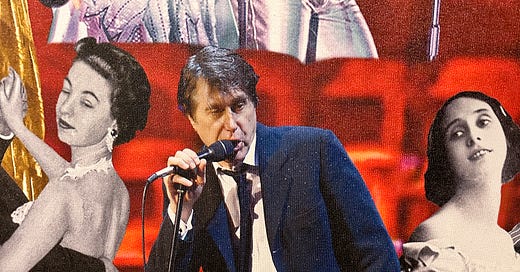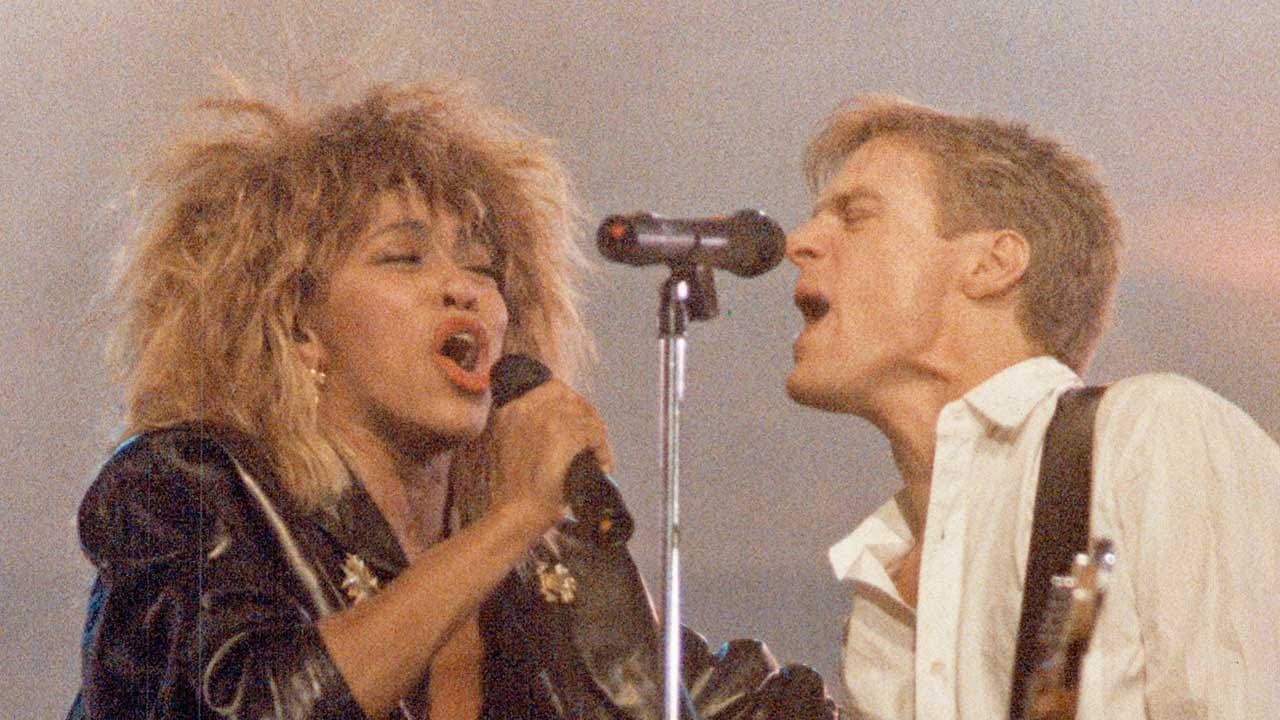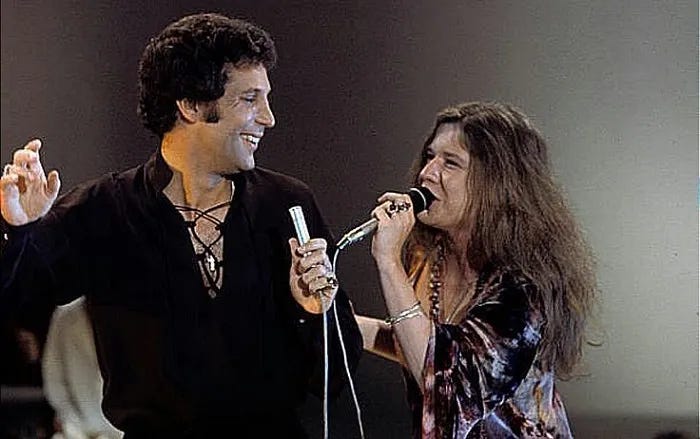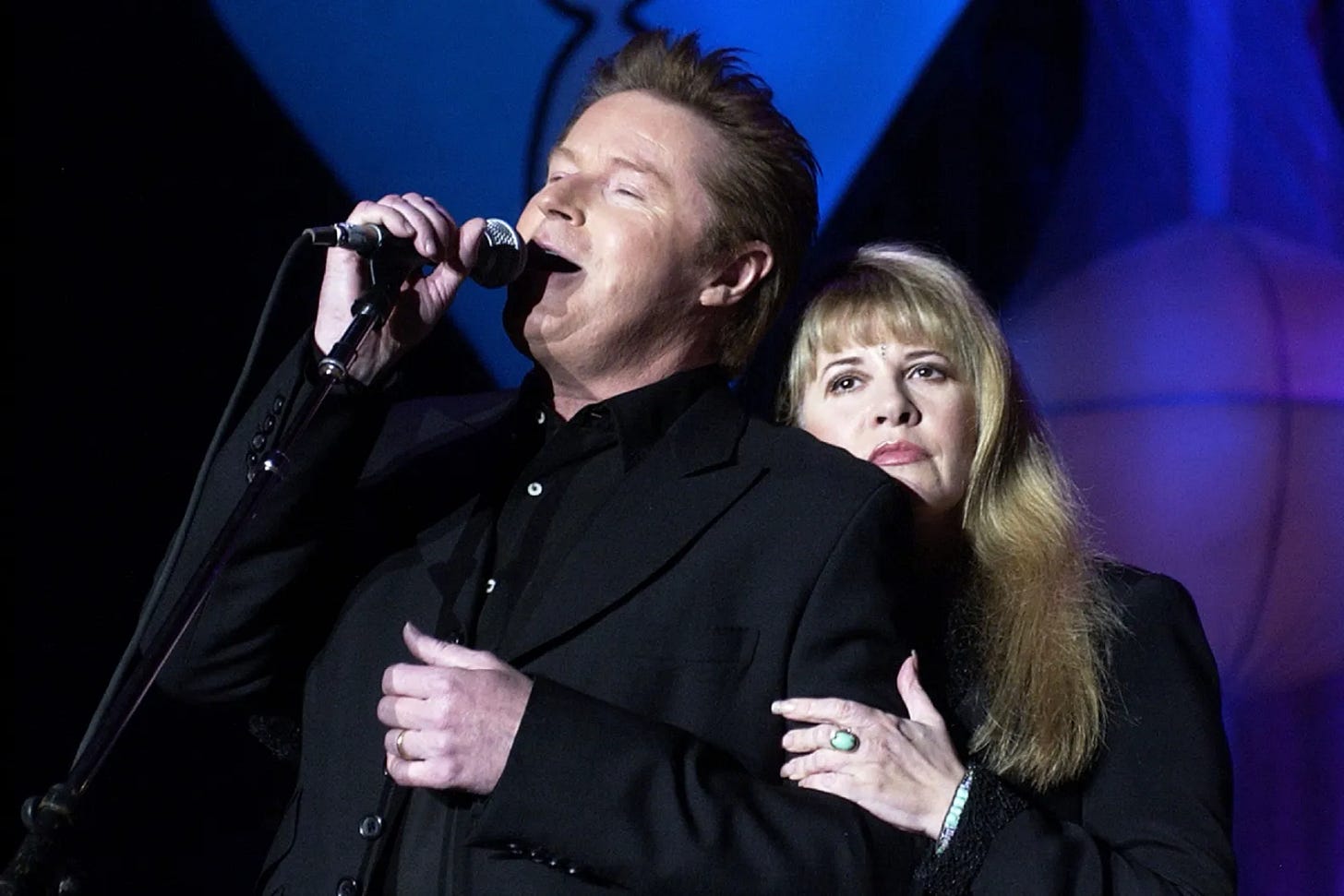Not lovers, not friends.
But somehow their voices kiss—
Three minutes of truth.
(Dateline: Marseilles) There’s something thrilling—magical, tragic, a little drunk—about a duet. It’s musical co-parenting: equal parts collaboration and chaos.
Done right, it’s the sonic equivalent of peanut butter and chocolate on Valentine’s Day. Think: Sonny & Cher’s “I Got You Babe.”
Done wrong, it’s tequila and milk after divorce court—tragic, messy and guaranteed to curdle. Think: Patti LaBelle & Michael McDonald’s “On My Own.” Or Streisand & Diamond’s “You Don’t Bring Me Flowers”—aka, musical resentment in 3/4 time.
Duets are often power moves. “I’m great. You’re great. Let’s be great together.” That’s the pitch. But egos are fragile, mics are hot, and not all pairings are made in harmony heaven. Sometimes it’s Taylor Swift…and some guy. Sometimes it’s Aretha Franklin absolutely demolishing George Michael like a gospel tank rolling over his falsetto garden (“I Knew You Were Waiting”). That imbalance? That’s the charm. One voice summiting Everest while the other takes the scenic gondola ride.
Even the big hits often feel mismatched. “Empire State of Mind”? Jay-Z gave us NY street pimp optimism and verbal elbow grease. Alicia brought actual music and lungs. One was slinging Big Apple slogans. The other was New York. And I’m not alone on that.
Duets are musical blind dates. Two singers walk into a studio—maybe friends, maybe strangers, maybe lovers (maybe court-ordered)—and walk out with three minutes and thirty-eight seconds of emotional karaoke. And it’s usually a love song. “Endless Love,” “Islands in the Stream,” “Don’t Go Breaking My Heart”—basically all of them could be subtitled: Look lovingly into each other’s eyes and pretend this isn’t weird. Residuals arrive in a month.
Sometimes, it works. Like Ozzy Osbourne & Miss Piggy (Yes, that really happened!). But seriously, Marvin Gaye & Tammi Terrell? Telepathic chemistry. Johnny Cash & June Carter? Actual soulmates. But others feel like musical Tinder dates arranged by a desperate record exec. “We need a hit, and you need PR. You two—pretend you love each other!” Like my prom date in ’76.
When Stars Collide
Enter: the power duet. Not just a song—a full event. Smoke machines. Red carpets. Grammy bait. Think: “Put a Little Love in Your Heart” (Al Green & Annie Lennox), “Don’t Know Much” (Linda Ronstadt & Aaron Neville), or “No Air” (Jordin Sparks & Chris Brown…back when that was still okay). These duets get awards-show performances, standing ovations, and zero rehearsal time. It's not harmony—it’s drama. It’s a vocal tennis match. And we eat it up like reality TV with better lighting.
Punk Gets Sentimental
Punk rock duets are chaos incarnate. Punk doesn’t share well—let alone harmonize. Most frontmen wouldn’t share a stage, much less a verse. My eyes go blind even thinking about Joe Strummer singing a love song duet. Punk just doesn’t naturally lend itself to sharing. But when it happens? It’s fireworks.
Exene Cervenka & John Doe (of X) brought snarling punk poetry to life—less harmony, more melodic arguing. Joey Ramone & Debbie Harry’s “Mr. Punchy” is like a punk slow dance under a flickering light. Weird. Awkward. Endearing.
Or Iggy Pop & Kate Pierson on “Candy”—a meandering little duet about heartbreak, more bus-stop romance than leather rebellion.
And of course, there’s "Fairytale of New York" by Shane MacGowan (of The Pogues) & Kirsty MacColl. A sweet, drunken holiday brawl of a song. They don’t sing to each other—they sling insults. That’s not a duet—it’s a Christmas knife fight set to music. And it’s brilliant. That’s the punk spirit. If you’re going to sing a duet, why not make it a duel?
And speaking of duels…I’m going out on a limb here, but I am guessing that country music is the mothership of the whole duets genre. A girl named Loretta; a boy named Conway: It’s longing, drinking, threatening, and crying in harmony. Cue steel guitar and porch swing. Okay, now that that’s settled, let’s move on…
Also, Natalie Cole singing with her late father? Technically gorgeous. Emotionally manipulative. Maybe more than a little bit creepy. And Tupac hologram duets? File under: weird, but profitable.
.feat (pronounced “dot feet”—by absolutely no one, yet)
Once upon a time, you had duets, in all their above-mentioned glory: Two artists met in a smoky studio, shared a microphone, probably shared a bottle, possibly a few lines, and made something new. Now? It’s “Artist A .feat Artist B”—not a collaboration, as much as licensing agreement with Auto-Tune. Algorithmically produced.
In today’s pop world, a “duet” often means: one singer croons sincerely while someone else bursts in halfway through with a 12-second rap verse scrawled on an In-N-Out napkin in the back of an Uber. Looking at you, 2010s. Every track suddenly .feat Pitbull or Nicki Minaj. One minute you're feeling something, then BOOM—Mr. Worldwide is shouting about VIP bottle service in Ibiza. (BTW: I can almost see Ibiza from where I’m typing!)
(For complete effect, please now picture a man on a porch yelling at kids.) These aren’t duets. They’re guest spots. Musical LinkedIn endorsements. If there’s no harmonizing, no emotional interplay, it’s not a duet—it’s a cameo with a beat. It feels less a collaboration and more a Spotify-era participation trophy. Today, an estimated 20–40% of pop and hip-hop tracks include a .feats. And that’s a lot of glorified drop-ins.
And the crimes against music committed in the name of .feat are many:
The Ghost Vocalist: Someone’s .feat but only sings for 0.7 seconds. Blink and they’re gone.
Algorithm Collab: Artist A + TikTok Rapper B = Chart Optimization. Chemistry be damned. But…you add it nonetheless to Your Workout Mix Vol. 7.
The Hijack: Artist A invites Artist B, and B steals the chorus, bridge, and spotlight, leaving A in the background, blinking like a musical hostage.
The Obligatory Latin Remix: Because the boardroom said so. English song now .feat Bad Bunny or J Balvin. Cultural resonance optional. Next up? The K-pop remix .feat one of the seven interchangeable heartthrobs from BTS. (Can you say Menudo?)
Two Mics, One Shot
Still, let’s not get cynical. A real duet—a true duet—is alchemy. It’s two voices creating something neither could do alone. You don’t hear one singer and then the other; you hear a single intertwined expression. The blend becomes a new instrument altogether. Like four legs in the grass after a Sunday picnic. Sorry…Think Ella & Louis. Peter & Kate. Maybe even (whispers) Travolta & Newton-John. (Okay, forget that last one.)
When it works, it’s intimate. Personal. Almost voyeuristic. Like hearing two people share a secret—one that rhymes.
Duets are risky. High-wire acts. They can soar or crash. But that tension? That mess? That’s what makes them magic. Especially in the punk-rock genre that is allergic to polish. The best duets sound like accidents. Beautiful, glorious accidents.
Because at their best, duets remind us what music—and life—is really about: connection. Two voices shouting the same line for different reasons. Two styles crashing into each other and, for a moment, harmonizing. It’s messy. It’s real. It’s irresistible. It’s human.
Even if your duet’s a little flat, or your .feat misses the beat—it’s still better than singing alone.
A Few of My Favorite Male/Female Duets (not previously mentioned):
Neil Tennant & Dusty Springfield - ‘What Have I Done To Deserve This?’
Eminem & Dido - ‘Stan’
Prince & Sheena Easton - ‘U Got The Look’
Common & Lily Allen - ‘Drivin’ Me Wild’
Jane Birkin & Serge Gainsburg - ‘Je T’aime… Moi Non Plus’ (Serge, you naughty boy!)
Chrissie Hynde & Neil Tennant – “Let’s Get Lost”
Glenn Hansard & Marketa Irglova – “Falling Slowly”
Stevie Nicks & Don Henley – “Leather and Lace”
Stevie Nicks & Tom Petty – “Stop Draggin’ My Heart Around”
John Mellencamp & Me’Shell Ndegeocello – “Wild Night”
Father John Misty & Lana Del Rey – “Let the Light In”
Taylor Swift & Kendrick Lamar - “Bad Blood”
Chrissie Hynde & UB40 – “I Got You Babe” (And a cover to boot!)
Thanks for the privilege of your time, it is the most precious thing we have, and I appreciate it. Be well.
William D. Chalmers © 2025 All Rights Reserved








